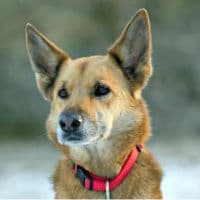FYI: If you buy something through a link on this site I may earn a commission - at NO extra cost to you.
What To Feed An Old Dog That Won't Eat
It's not unusual for a dog's appetite to decrease as he ages, but knowing what to feed an old dog who won't eat can help keep a golden oldie healthier and stronger for longer.
Adequate nutrition is important to dogs of all ages and it's important to encourage your old dog to eat, even if his appetite is waning, and there are many ways you can stimulate your dog's appetite and get a picky eater to broaden his horizons!
But it's also important to know whether your senior dog's loss of appetite is simply a natural part of the aging process, or whether there are underlying medical conditions or health problems also playing a role.
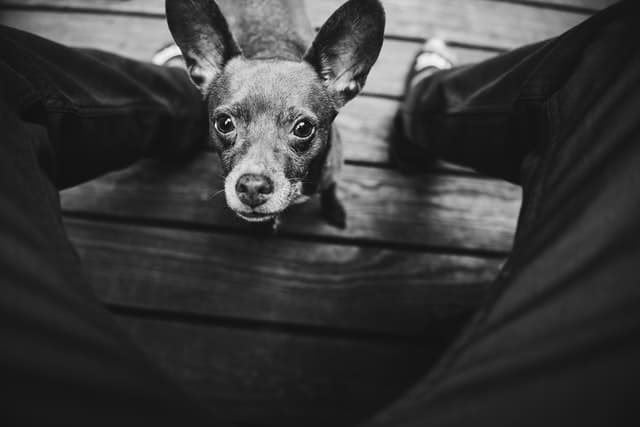
A healthy dog of any age won't starve himself, but surviving on minimal nutrition is undesirable at best and dangerous at worst.
Not drinking water is a different issue and dehydration can quickly lead to serious health complications, even death, so if your senior dog isn't drinking water he needs immediate veterinary help.
Health Concerns When An Old Dog Won't Eat
When a senior dog is refusing to eat, or eating very little, it's important to look at his overall health.
If the decrease in appetite has been gradual, and there are no other signs or symptoms of illness, it's may just be due to old age (elderly dogs have a slower metabolism and a lower activity level than younger ones, this naturally affects appetite).
However in an older pet, if loss of appetite is sudden and happens over a couple of days rather than over months, or even years, or if there are any new or worsening symptoms or significant changes in health or behavior which show a dog isn't feeling well, it's important to have him evaluated by a veterinarian quickly.
Health issues that can affect a senior dogs appetite can be minor, or serious, and only a veterinarian can make an accurate assessment and diagnosis.
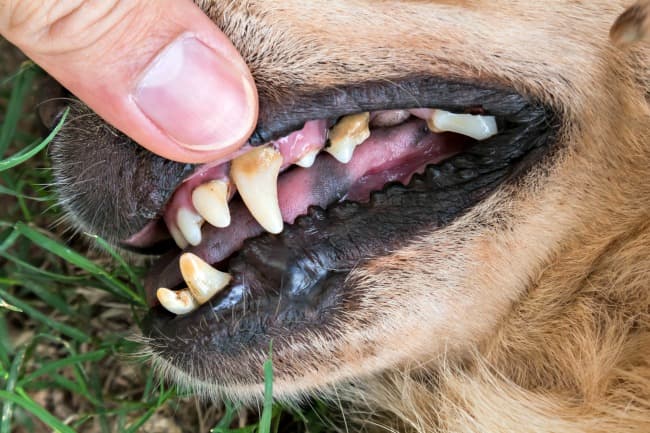
Some possible reasons for an old dog refusing to eat include:
Dental Disease - Dental issues such as missing, broken or infected teeth/gums can make the act of eating hard foods both problematic and uncomfortable.
Anxiety or Depression - older dogs can be anxious or depressed for lots of reasons including changes in his environment or routine, loss of another pet or family member, a house move, cognitive issues etc.
Kidney Disease - Loss of appetite is a common symptom of kidney disease in dogs, as are increased thirst and urination.
Liver Disease - A dog with liver disease usually has decreased appetite and weight loss, as well as increased thirst and urination and in more advanced cases may also have blood in his urine/stools, a swollen abdomen and more
Hypoglycemia - Hypoglycemia happens as a result of low blood sugar. Small breeds, along with the tiny and toy breeds, have a higher risk of developing this than larger ones. Other canine health conditions which can have hypoglycemia as a symptom include Addison's Disease, Diabetes and Liver Disease.
Heart Problems - Heart disease often causes a decrease in a dog's appetite, along with symptoms like a chronic cough, breathing difficulties, fatigue etc.
Cancer - Some cancers in dogs can cause loss of appetite, others may actually make a dog hungrier than normal. There are many canine cancers and too many symptoms to list, but in older dogs cancer is always a possibility
Canine Cognitive Dysfunction - This is similar to Dementia or Alzheimer's in humans and some degree of cognitive decline is common in elderly dogs
Other, usually less serious, issues that can cause an old dog to refuse to eat, or to eat less, include:
- Reduced senses of smell and taste
- Discomfort or pain from existing health conditions
- Side effects of medications (these can cause stomach upset, nausea, fatigue etc.)
- Constipation
If your veterinarian finds that there are health problems causing your senior dog's lack of appetite he/she can help you choose the best diet for his specific issues and advise you on how to handle the problem.
For more information on many of the senior dog health conditions listed above, check out my Senior Dog Health Guide. The more you know the easier it will be to help your dog.
12 Tips For Feeding An Old Dog That Won't Eat
There are lots of different ways that you can help a senior dog who won't eat. None of them are difficult, and with luck you'll find some that help your golden oldie remember that he actually likes food and mealtimes!
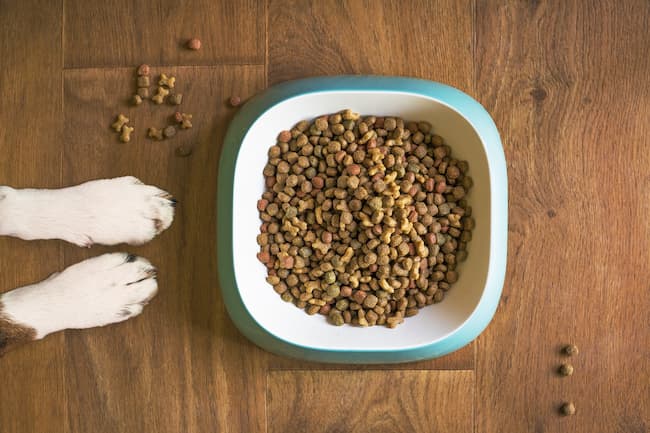
Choose the right food
If your old dog is eating less, it's even more important to make sure he's able to get maximum nutritional benefit from what he does eat!
But it's also important to know that there's no one-size-fits-all choice when it comes to dog food, and while a senior dog formula dog food may be the best choice for your golden oldie, it's by no means a certainty.
Senior dog food formulas are often low in fat and low in protein. Low fat content can be beneficial for elderly dogs with certain health conditions (eg. cardiac or pancreatic disease), or for dogs who are overweight or obese. However low protein foods are, contrary to popular belief, not necessarily beneficial for older dogs because protein requirements tend to increase with age.
Look for a food that contains:
- High quality, easily digestible protein (such as chicken, lamb or beef - needs to be MEAT, not MEAL, eggs are also good).
- Complex carbohydrates (whole grains and vegetables are good sources)
- Added vitamins and minerals including vitamins A,D and E and zinc, copper and selenium
- Fatty acids such as Omega 3's and DHA
Although many senior dogs are still able to eat dry kibble, for those with dental problems it can help if you soak the kibble in warm water (or even better, warmed low sodium chicken broth or bone broth) so that it's easier for them to chew.
Wet food can be added to an old dogs regular food, or for small and tiny breeds can even replace it. However, as canned food has a water content up around 75-80% , there is significantly less nutrition when compared to dry food.
If you do decide to switch your dog to a new food, make the change slowly over several days to avoid giving him an upset stomach . You can slowly add the new food to the familiar one, increasing the new and decreasing the old until the switch is complete.
Check out this page to get more information on feeding older dogs, and their unique nutritional needs.
You can even make your dogs food yourself if you'd like to. Check out this page to learn all about homemade dog food and how to do it right.
Home made dog food gives you all the control over ingredients (and their quality), it smells better and is tastier than commercial dog food, which means that even a picky senior dog is likely to eat it.
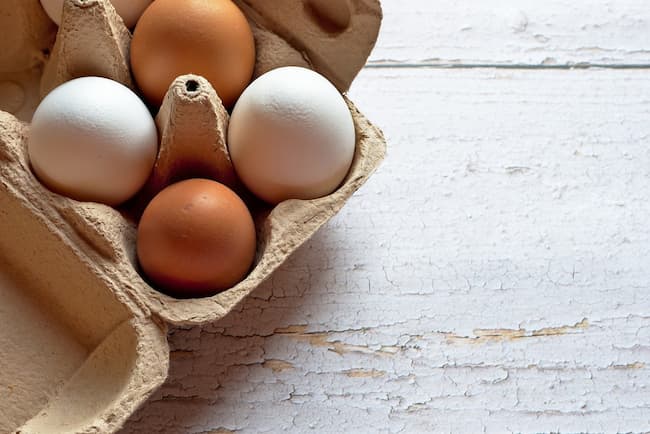
Make your dog's food extra appetizing
Senior dogs often have a blunted sense of taste and even their sense of smell is diminished.
Because enjoying food depends on these senses it's easy to understand why an older dog might lose interest in his regular kibble. Even if your dog's diet is ideal in terms of nutritional value, making it smell and taste a bit better can only improve things.
The quickest ways to make your dog's food more appealing to him include:
- Add warm, low-sodium, chicken broth or (even better) bone broth to his kibble, soaking it for a few minutes to let the aroma build and the kibble soften.
- Add a couple of spoonful's of wet food on top of the kibble and mix it in well to encourage your dog to eat both kibble and canned food.
Check out all the ideas below for other tasty additions you can make to your old dog's meals which can get his tastebuds firing again.
Keep your old dog's mealtimes interesting
Change things up in his bowl regularly because the same old, same old is boring!
You can choose from a variety of other toppings which can be added to his bowl including scrambled eggs (or egg whites), low fat cottage cheese, scraps of cooked liver, grated parmesan cheese and more. peanut butter (make sure the brand you use does NOT contain Xylitol) can be diluted with a little warm water poured over dry dog food.
Green tripe is a great protein source and also contains amino acids, enzymes and 'good' bacteria that can provide excellent, and TASTY, nutrition for your older dog. Canned tripe, frozen ground tripe or dog foods containing tripe are all good sources.
You can try adding ready-made gravies, food toppers (eg. Honest Kitchen Meal Boosters) or look into a fresh dog food delivery service for healthy, delicious meals formulated to fit your dog's needs. TheFarmersDog and Spot&Tango are both great options.
Although not all dogs enjoy vegetables, many do. Adding boiled or steamed vegetables to your senior dog's food delivers flavor and texture, as well as important nutrients and fiber. Older dogs often have a sluggish digestive system and can suffer from constipation, vegetables help with that.
A couple of tablespoons of canned pumpkin (not the pie filling variety) can help with both constipation and diarrhea.
You can also help improve your senior dog's appetite by not feeding him the same thing every day.
Some picky eaters will only eat, or enjoy, a new or different food for a few days at a time. So you can try rotating toppings to make what's in his food bowl more exciting and an enjoyable surprise each time.
Remember to make dietary changes slowly!
Just one caveat when it comes to varying your old dog's diet - don't make a whole lot of changes at once!
Whenever you add a new food or topping, it's a good idea to just offer a little bit at first and make sure it doesn't cause any digestive upsets. Then wait a day or two before introducing a different option.
Once you find out what he enjoys, and what doesn't cause any tummy troubles, you'll have a range of tasty ways to get your old dog to eat more, and hopefully to begin enjoying mealtime more again.
Reduce meal size & frequency
If your senior dog only eats a little of what you put down for him, he may actually eat more over the space of a day if you offer him three or four smaller meals rather than one large one.
Don't leave his bowl down all day as a 'grazer' is never going to really feel hungry, especially if he's an elderly dog with a slowed down metabolism and limited physical activity.
Offering him small, but tasty and varied, meals may stimulate your dog's appetite and increase his food intake over the course of the day, even if he's eating less food per sitting.
Don't let your old dog fill up on treats and tidbits
When Fido isn't eating dog owners can be inclined to resort to feeding him whatever he'll accept and swallow (and as a dog owner myself I'm also guilty of having done this at times!). But doing this can actually make the whole situation worse!
If you let your senior dog eat a lot of his favorite treats, or tasty human food, his already diminished appetite will be satisfied but his nutritional needs won't.
This doesn't mean your senior pup can't have any treats of course, it just means that putting a little extra thought into the treats he does get, and only feeding them in small amounts, can help avoid problems.
Tiny, healthy, tasty treats are the best choice. You don't want your golden oldie filling up on junk right? Stay away from highly processed treats because there is no nutritional value to them. Instead it's a good choice to offer a tiny piece of something like cooked liver (or freeze dried liver), cooked chicken or cooked ground beef.
Increase appropriate exercise
Senior dogs are naturally less energetic than younger ones, and some health conditions like joint pain, loss of muscle mass, excess weight etc. can also conspire to reduce an old dog's interest in getting up and moving.
But it's important that dogs of all ages get an appropriate amount, and type, of exercise as it helps burn calories, increase metabolism and boosts their mood. If your golden oldie is a total couch potato, just adding a little gentle movement and exercise (both physical and mental) could be beneficial to more than just his eating habits.
Before adding any kind of new, or additional, physical exercise to your old dog's routine it's important to check with your veterinarian and make sure what you're planning is safe for him. If he has underlying health conditions you'll also need to keep these in mind and accommodate them.
As with all changes, once you get the go ahead from your dog's vet, START SLOW.
A gentle amble down the street and back may feel like a 5 mile hike to your old dog, so keep expectations realistic. Adding a daily walk, (doesn't matter how short it is), or adding an additional walk if your dog already goes out daily, is a great start and you can increase the length or speed as and when your dog is able to handle it.
Physical exercise isn't the only thing that uses up energy, mental stimulation also burns calories and can add some much needed variety and interest to an old dog's day. Interactive toys, learning a new trick or skill (yes, you can teach an old dog new tricks) or even just practicing existing ones that are a bit rusty, are all good options.
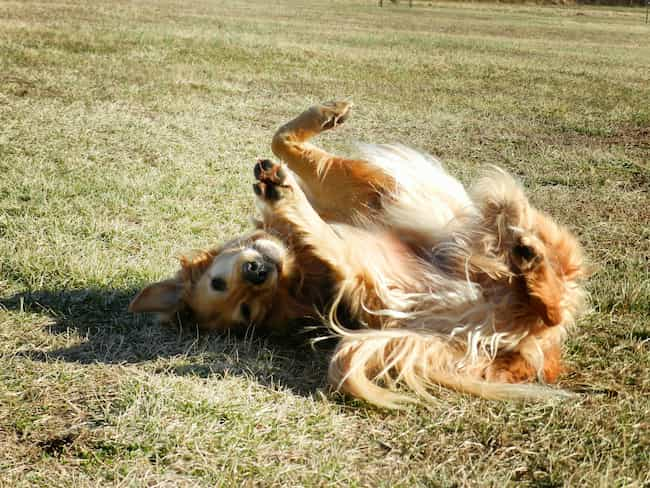
Consider changing the height of your dog's food bowl
Aging can lead to aches and pains and a body that isn't as flexible as it used to be!
Bending down to eat at floor level, especially for large breeds or those with elongated spines (think Dachshunds and Basset Hounds for example) can become uncomfortable, even painful, for older dogs.
Using an elevated food bowl might make mealtime easier for your old dog, and it's a simple change that's easy to try and could show immediate results.
Give Lick Bowls or Lick Mats a try
Some dogs really enjoy these! As the name suggests these bowls and mats are designed to encourage dogs to lick the food off them.
Dogs love to lick, and the act of licking actually releases endorphins (feel good chemicals) which helps relieve any anxiety and improve their mood, as well as providing some of that mental stimulation that older dogs often don't get enough of.
Lick mats and bowls are usually made from silicone or thermoplastic rubber and have a textured surface with raised patterns (nodules, grids,, honeycomb shapes, divots etc.).
These mats work best food that is wet/moist/sticky/soft, so canned dog food, or softened kibble that has been mixed with gravy, peanut butter, cottage cheese etc. (basically what I discussed HERE).
Try hand feeding your senior dog
This can be helpful for older dogs who are having physical issues picking up their food, or who may have cognitive dysfunction or dementia and be confused about how/when to eat.
Hand feeding is exactly what it sounds like. Either let your dog eat out of the palm of your hand, or feed it direct to his mouth one piece at a time.
This is a time consuming act of love but once you rekindle the enjoyment and habit of eating you may find your dog can revert to eating out of his bowl, at least some of the time. Especially if you sit with him while he eats.
Appetite stimulants
If he's basically healthy, and you've tried all the simple tips above but your old dog still refuses to eat enough, it might be worth asking your veterinarian about an appetite stimulant for him.
There are several available and they can increase appetite quickly, usually leading to weight gain, which is good for underweight dogs.
However, an appetite stimulant isn't going to address the reason for your dog's loss of appetite and should never be used without a veterinarian's approval and full knowledge of any underlying health issues.
Artificially increasing an older dog's appetite without knowing why he's not eating can be dangerous.
Recognize & treat anxiety or other emotional or cognitive issues
Sometimes pet owners forget that their pets can have emotional and cognitive issues as well as physical ones.
Some dogs can develop cognitive and behavioral issues as they age. Anxiety, depression and cognitive impairment are not unusual.
There are medications for all of these conditions, and if you think your senior dog is suffering from any of them it's a good idea to discuss it with your veterinarian.
Consider trying CBD
For mild anxiety, CBD oil can be beneficial. You can get CBD oil or capsules especially formulated for dogs which you can add to Fido's meals.
The benefits of CBD for old dogs doesn't stop at improving appetite, it can also lift their mood, as well as reduce pain and inflammation.
If your senior dog has kidney problems, check with your veterinarian before giving him CBD products or any type of supplement/medication because impaired kidney function can also affect the way in which drugs of any kind are excreted from the body.
Check out this page on the American Kennel Club's website for more information on giving CBD to dogs which health conditions CBD can help with (and the relevant studies).
you might also like...
- Home
- What To Feed An Old Dog
- What to Feed an Old Dog That Won't Eat
FTC Disclosure: Some pages on this site contain affiliate links. I may earn on qualified purchases.



